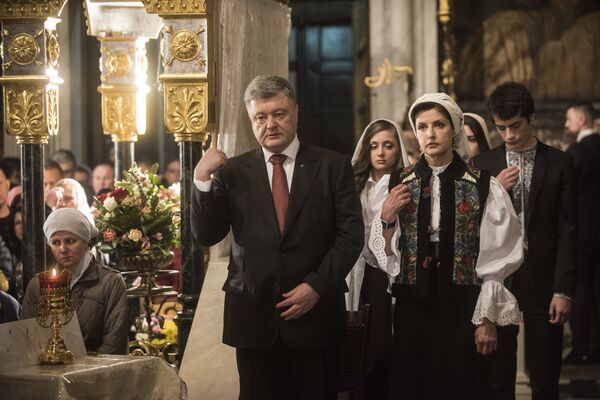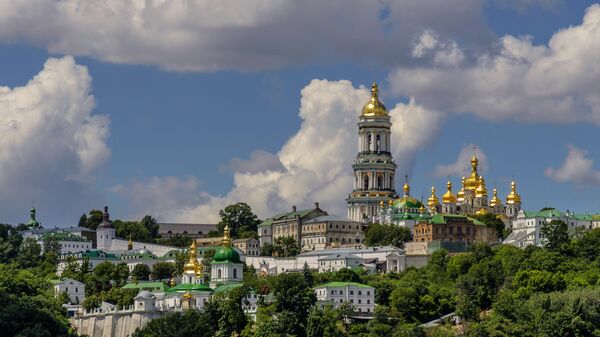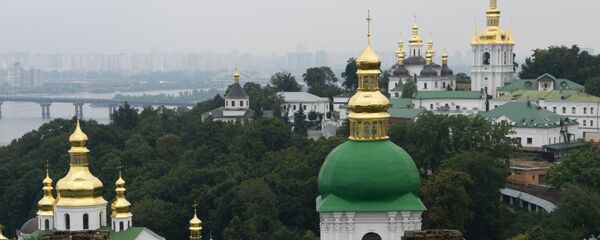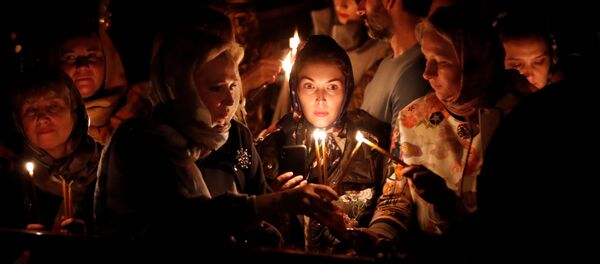Ukrainian President Petro Poroshenko announced last month that the Constantinople Patriarchate had begun the procedure to create an "autocephalic" or "self-headed" Ukrainian Orthodox Church, in a move Kiev claimed would remove unwanted Russian "influence" over Ukraine ahead of next year's elections. The Constantinople Patriarchate has confirmed that it would consider Kiev's request, but added that it would "closely communicate and coordinate with the sister Orthodox Churches concerning this matter."
Archpriest Nikolai Balashov, vice chairman of the Moscow Patriarchate's department for external relations, spoke to Sputnik about the contentious issue to offer a better understanding of the Ukrainian government's initiative, and why the world's Orthodox community, including Constantinople's Patriarch, will be unlikely to support it.
"The Constantinople, Alexandria, and Jerusalem Patriarchates, as well as the Greek Orthodox Church, emphasized the priority of the jurisdiction of the Ecumenical Councils and the Local Councils of the Constantinople Patriarchate in the granting of autocephaly. The Moscow, Romanian and Bulgarian Patriarchates, as well as the Polish Orthodox Church, proceeded from the independent right of each Local Church to grant autocephaly to its canonical part," Father Nikolai explained.
An agreement was reached, however, in that all Churches approved the idea that there could be no proclamation of self-rule without the express agreement of the Mother Church. Furthermore, it was agreed that autocephaly would require "all-Orthodox consent." On this basis, Father Nikolai noted, it was decided that the next step should be to "agree on the [concrete] procedure and details of the process."

It would be many years before the global Orthodox community would return to the self-rule issue. According to Father Nikolai, the meeting of the Inter-Orthodoxy Preparatory Commission in Chambesy in 2009 saw one more important step made in reaching inter-Orthodox agreement on the issue, namely through the finalization of Article 3.C, the final paragraph of rules on autocephaly which could not be approved sixteen years earlier:
"In the expression of consent of the Mother Church, and of all-Orthodox consensus, the Ecumenical Patriarch officially proclaims the autocephaly of the Church requesting it through the publication of a Tomos [a small book containing a major announcement] about autocephaly. This Tomos is signed by the Ecumenical Patriarch and witnessed by the signatures of the Most Blessed Primates of the Holy Autocephalous Churches, invited for this purpose by the Ecumenical Patriarch."
"This paragraph further accented the need for all-Orthodox accord as a condition of autocephaly," Father Nikolai noted. "However, at the same time, questions remained about the content of the Tomos, and the way it would be signed by priests. These were carried over to the next Commission in the search of a unified position of the Churches."
Still, Father Nikolai stressed that "Patriarch Bartholomew I of Constantinople assured Patriarch Kirill of Moscow and All Rus' that neither at the Council nor after it would the Constantinople Patriarchate undertake any actions related to the legalization of a split, or the granting of autocephaly in Ukraine."
Background: Ukraine has three Orthodox communities – the Ukrainian Orthodox Church of the Moscow Patriarchate (the country's largest religious community, enjoying the patronage of some one in five Ukrainians), the smaller Ukrainian Orthodox Church of the Kyivan Patriarchate, and the Ukrainian Autocephalous Orthodox Church. The latter churches were established in the early 1990s, and are not recognized by the world's canonical Orthodox Churches. Amid the breakdown in relations between Kiev and Moscow beginning in 2014, the Ukrainian government sought to distance itself from Russia in the political, economic, cultural spheres. This spring, President Poroshenko announced a campaign to continue the effort, this time in the religious sphere. Kiev's move has been criticized by members of the Orthodox community, who have insisted that the Church self-rule issue "mustn't be guided by political considerations."
The views and opinions expressed by Father Nikolai Balashov are those of the speaker, and do not necessarily reflect those of Sputnik.




